FOCUS
ON UKRAINE AND RUSSIA'S FUTURE
PAGE 5

PAGE 5
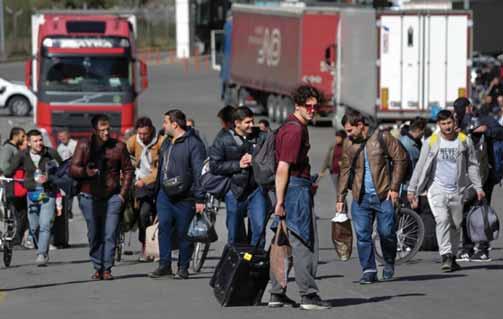 ANALYSIS BY SAAHIL MENON
ANALYSIS BY SAAHIL MENON
Russia’s recent move to abolish entry requirements for Georgian citizens and reinstate air connectivity between both countries might seem like an overdue goodwill gesture without any strings attached or conceivable caveats. Make no mistake, however, this overture is part and parcel of a carefully crafted foreign policy calculus which serves the Kremlin’s manifold geostrategic interests. For starters, a reciprocal visawaiver agreement will help quash growing calls by civil society and prominent opposition figures in Georgia to rescind the year-long, uninterrupted stay Russian nationals enjoy on their territory. As the carnage in Ukraine intensifies and risks spilling over into the Russian Federation proper, President Putin should presumptively be looking to disincentive overseas trips by able-bodied reservists and ensure that an adequate pool of fighting-age, combat-ready men are at his beck and call when push comes to shove.

Continued on page 4
In this week’s issue...
Ukraine Latest: Zelensky Warns of ‘Dangerous Provocations’ at Nuclear Plant, Yevgeny Prigozhin Resurfaces in Russia
NEWS PAGE 2
What Happens If Ukraine and Georgia Have a ‘Break Up’?
POLITICS PAGE 3
Media Plurality or Media Surfeit?
POLITICS PAGE 4
Solomiia Bobrovska on Zelensky’s Latest Demand for Saakashvili’s Release, and Georgia’s Future Prospects Should It Refuse
POLITICS PAGE 6
USAID YES-GeorgiaRegional Awareness Campaign Plan on Women’s Entrepreneurship in Kakheti
SOCIETY PAGE 8
Embassy of the United Arab Emirates in Tbilisi Organizes Charity Project on the Occasion of Eid AlAdha 2023
SOCIETY PAGE 9
Belmond Restaurant and Lounge for Special Moments
SOCIETY PAGE 10
Wired for Sight
CULTURE PAGE 11
Ukrainian President Volodymyr Zelensky said late on Tuesday that he told French President Emmanuel Macron about “dangerous provocations” at the Russian-held Zaporizhzia nuclear plant.
In parrallel, Russian state news agencies quoted an advisor to the country’s nuclear network operator as claiming Ukraine was planning an attack on the pivotal facility.
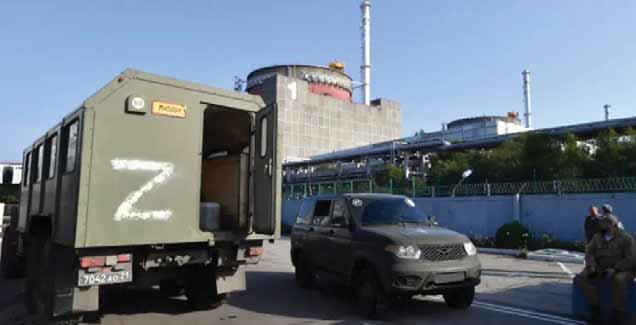
Russian shelling claimed further lives on Ukrainian grounds on Tuesday, with more dead now reported in Sumy and Kherson.
Ukraine’s military also claimed on Telegram that it had destroyed a Russian unit in Moscow-controlled Makiivka, although Russian-installed representatives in the region alleged that civilians had been hit in the attack.
The chief of the International Atomic Energy Agency said that there were no reports of increased military presence at the Russian-occupied Zaporizhzhia nuclear power plant.
IAEA Director General Rafael Grossi said in a statement that the team of IAEA representatives at the plant had not reported recent shelling or explosions, nor additional Russian forces at the site.
“The IAEA experts have requested additional access that is necessary to confirm the absence of mines or explosives at the site,” wrote Grossi in a statement. “In particular, access to the rooftops of reactor units 3 and 4 is essential, as well as access to areas of the turbine halls and some parts of the cooling system at the plant,” he added.
Grossi’s comments come as Ukraine and Russia accuse each other of preparing for an attack on the nuclear power plant facility, which is Europe’s largest.
Chinese President Xi Jinping during his visit to Moscow in March warned Vladimir Putin against the use of nuclear weapons in Ukraine, the Financial Times reported Wednesday, citing western and Chinese officials.
Chinese officials have privately taken credit for the Kremlin backing away from veiled threats of nuclear force expressed earlier in the conflict, the sources said.
Andriy Yermak, a top advisor to Ukrainian President Volodymyr Zelenskyy, said China’s reported opposition to Russia’s threats of nuclear force is “an important position.”
Posting on Telegram, the head of the president’s office shared a screengrab of the Financial Times article reporting that Chinese President Xi Jinping, during a visit to Moscow in March, personally warned Russian President Vladimir Putin against using nuclear weapons in Ukraine.
Ukraine’s military claimed late on Tuesday to have destroyed a Russian unit in Makiivka, a Moscow-held territory in the Donetsk region.
“As a result of precision firing by Defense Forces units, another formation of Russian terrorists in the temporarily occupied Makiivka ceased to exist,” the strategic communications office for Ukraine’s Armed Forces said on Telegram, alongside a video of apparent explosions in the distance.
The Russian-installed head of the region, Denis Pushilin, claimed on Telegram that the Ukrainian shelling had resulted in civilian casualties.
“Late in the evening, the enemy launched fierce attacks on residential areas and the hospital complex of the Chervonogvardeisky district of Makeevka. The blast wave was felt by the majority of residents of Makeevka and Donetsk,” Pushilin said.
“At the moment, 25 victims are known, including two children wounded: a girl 2 years 9 months old, and a 7-year-old boy.”
Neither claim could be independently
verified. Since the start of the Russian invasion, both sides have accused one another of targeting civilians and denied doing so themselves.
At least 31 people, including nine children, were wounded in Russian shelling on the small town of Pervomaiskyi in Ukraine’s northeastern Kharkiv region, officials said Tuesday.
The windows of multi-story buildings were smashed and cars were set alight in the shelling which occurred at 1:35 p.m. Kyiv time, Kharkiv regional governor Oleh Synehubov wrote on Telegram.
Wagner mercenary leader Yevgeny Prigozhin appears to have resurfaced on social media after being exiled to Belarus since his failed insurrection 11 days ago. A voice recording said to be of Prigozhin was posted on the Grey Zone Telegram
page, an account supportive of Russian mercenaries, with more than 500,000 subscribers.
“Today, more than ever, we need your support. Thank you for that,” the voice said.
“I want you to understand that our ‘March of Justice’ was aimed at fighting traitors and mobilizing our society. And I think we have achieved a lot of it,” it added.
“In the near future, I am sure that you will see our next victories at the front. Thanks guys!”
The mercenary leader has not been seen in public since the uprising 11 days ago.
REPORTS: ‘EXILED’ WAGNER BOSS RETURNS TO RUSSIA AND GETS HIS WEAPONS BACK Yevgeny Prigo zhin, who got off unscathed after staging an armed uprising against the country’s military leadership, is claimed to have returned to St. Petersburg to collect an arsenal of weapons confiscated from him by the security services.
Wagner Group founder Yevgeny Prigozhin was spotted Tuesday arriving at an FSB office in St. Petersburg along with his security team, local news outlet Fontanka reports. He had reportedly been invited to collect several weapons seized by security services in the wake of his attempted insurrection last month. Authorities handed over two Saiga rifles, a Mannlicher rifle, and several other firearms, according to Fontanka.
The lot reportedly also included a Glock pistol gifted to the mercenary boss by none other than Defense Minister Sergei Shoigu, whom Prigozhin had allegedly hoped to capture in his armed uprising and march on Rostov.
Prigozhin was also reportedly given back 10 billion rubles (more than $100 million) that law enforcement had found during a raid on one of his vehicles. The news comes after Prigozhin released a new audio message earlier this week promising new “victories on the frontline” even as the Kremlin insists he and Wagner have been banished to Belarus.
The embassies accredited in Georgia and the representatives of international organizations issue a joint statement in connection with the International Day of Combating Homophobia, Biphobia and Transphobia (IDAHOBIT).

In a joint statement, they welcome diversity and stand in solidarity with the lesbian, gay, bisexual, transgender, queer and intersex (LGBTQI+) community in Georgia.
The statement mentions that LGBTQI+ people experience harassment, discrimination and stigmatization every day, face hostility and violence.
The statement also states that they do not have the opportunity to live with dignity as free and equal members of the Georgian society.
“We welcome the increased public support for the protection of minority rights in Georgia – since 2015, the number of those who claim that the rights of LGBTQI+ persons should be protected has doubled. We also welcome the protection of people from discrimination based on their sexual orientation and
gender identity expression, which has been provided by the Georgian Law on the Elimination of All Forms of Discrimination since 2014. We recognize the efforts of various government agencies and civil society organizations to ensure full protection of human rights and freedoms,” the statement said.
In a joint statement, embassies and representatives of international organizations express their concern that, despite efforts, progress in this direction has been delayed.
“Newly adopted national policy documents, in particular, the National Human Rights Protection Strategy of Georgia for 2022-2030, the State Concept of Gender Equality of Georgia and Vision 2030 – Development Strategy of Georgia, do not include mechanisms for strengthening the protection and inclusion of LGBTQI+ persons. Stigmatization, discriminatory expressions and hate speech by some public officials, politicians, media and clergy contribute to further harassment of LGBTQI+ persons and endanger their lives. In recent years, the majority of people who clearly instigated and committed violence against LGBTQI+
people, including during Pride Week in July 2021, have not been brought to justice. This further limits the ability of LGBTQI+ persons to exercise their right to peaceful assembly,” the statement said. Embassies and representatives of international organizations emphasize that the exclusion of any member of society strengthens social, economic and political inequality and injustice, which hinders the further development of Georgia’s democracy.
“We call on the government of Georgia, political, civil and religious leaders to protect human rights in general, to raise their voice against hatred, discrimination and violence, to work with LGBTQI+ communities and to ensure their full enjoyment of human rights. We call on the government of Georgia to bring state policy and practice into line with Georgia’s international obligations. To protect the rights of LGBTQI+ persons and promote the development of an inclusive society in which everyone can safely and freely make decisions about themselves and their lifestyle. As international partners and supporters of Georgia, we are ready, together with our Georgian part-
ners, to continue working to achieve these goals,” the statement said.
The joint statement is joined by the United Nations Organization, the European Union Representation in Georgia, Austria, the United States of America, New Zealand, Belgium, Bulgaria, the United Kingdom, Germany, Denmark, Spain, Estonia, Ireland, Israel, Italy,
Canada, Latvia, Lithuania, the Netherlands, The embassies of Norway, Portugal, Romania, Greece, France, Slovakia, Slovenia, Finland, Sweden, Switzerland, the Czech Republic, the regional representation of the European Investment Bank in the South Caucasus and the head of the EU monitoring mission in Georgia.
Recent tensions over material support, relations with Russia, and of course former President Mikheil Saakashvili have brought Georgian and Ukrainian politicians to the brink of calling their relationship off. Despite decades of friendship and support, the war of words between the Ukrainian government and Georgia’s ruling party, Georgian Dream, stands to tear the Black Sea brotherhood apart.
Ukraine has long been seen as one of Georgia’s closest allies regionally. Ukrainians have taken part in almost all of Georgia’s wars of preservation, directly or indirectly, since the nation’s independence. Likewise, Georgian units, formally or informally, have fought side by side with Ukraine against Russia’s repeated transgressions. The pair even stood together during their application for European Union membership.
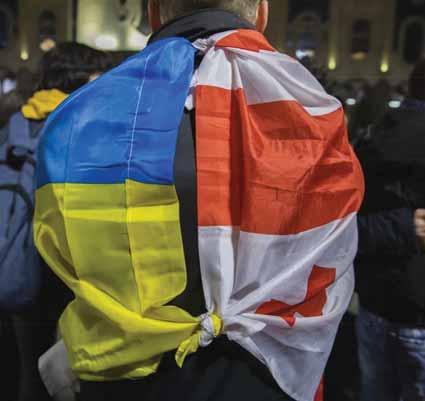
However, since Russia’s invasion of Ukraine, the tone in Tbilisi has changed. Parliament, led by Georgian Dream, has begun singing a different tune. The song now is not one of unity, shared sacrifice in battle, or kinship, but rather one of animosity and blame. While the two have had near-routine spats prior to the past week, Kyiv’s actions over the past few days and Tbilisi’s response have cemented the souring of relations.
“Right now, Russia is killing Ukrainian citizen Mykhailo Saakashvili at the hands of the Georgian authorities,” Ukrainian
President Volodymyr Zelensky tweeted on July 3rd, using the Ukrainian version of the former President’s name. In the same announcement and in a following video address, he continued, ordering the Georgian Ambassador out of Ukraine within 48 hours. This dismissal was “to express our strong protest and to ask him to leave Ukraine within 48 hours to hold consultations with his capital,”
Zelensky affirmed.
The Georgian Ministry of Foreign Affairs replied with indignance. In addition to calling the announcement destructive towards their diplomatic relationship, they added that it “constitutes a direct interference in the internal affairs of a sovereign state.” Giorgi Zakarashvili, the Georgian Ambassador to Ukraine, reportedly called Ukraine’s concerns for
Saakashvili “misguided” and that “Georgia has been providing maximum humanitarian and political support to Ukraine, including in all international arenas, in the United Nations, OSCE, Council of Europe, in all important international organizations”
While his order for removal is not a formal expulsion, it is considered on par to such an act and as Ukraine has already withdrawn its ambassador from Georgia, Tbilisi has no equal recourse. It’s unlikely that the ruling party will take concrete steps to amend relations and will almost certainly not hand Saakashvili to an outside entity. Regardless of any legal hurdles it may take, giving up the ailing former president relinquishes the largest political gambling chip in recent history. With the likelihood of reviving the friendship not currently on the table, this begs the question - what happens if Georgian-Ukrainian relations hit rock bottom? The answer paints a bleak outlook for Georgia’s diplomatic relations with other Western nations as well as the nation’s European Union aspirations. EU integration has been a tense topic for the Georgian authorities. Despite their past attempts and having to go back to the proverbial drawing board, ruling party members have routinely demanded that they be given a place in the alliance regardless of their fulfilment of EU requirements. The list includes 12 key points of improvement that are to be completed by the end of 2023. However, the resulting temper tantrum has put off European officials and caused them to further distance themselves from Georgia.
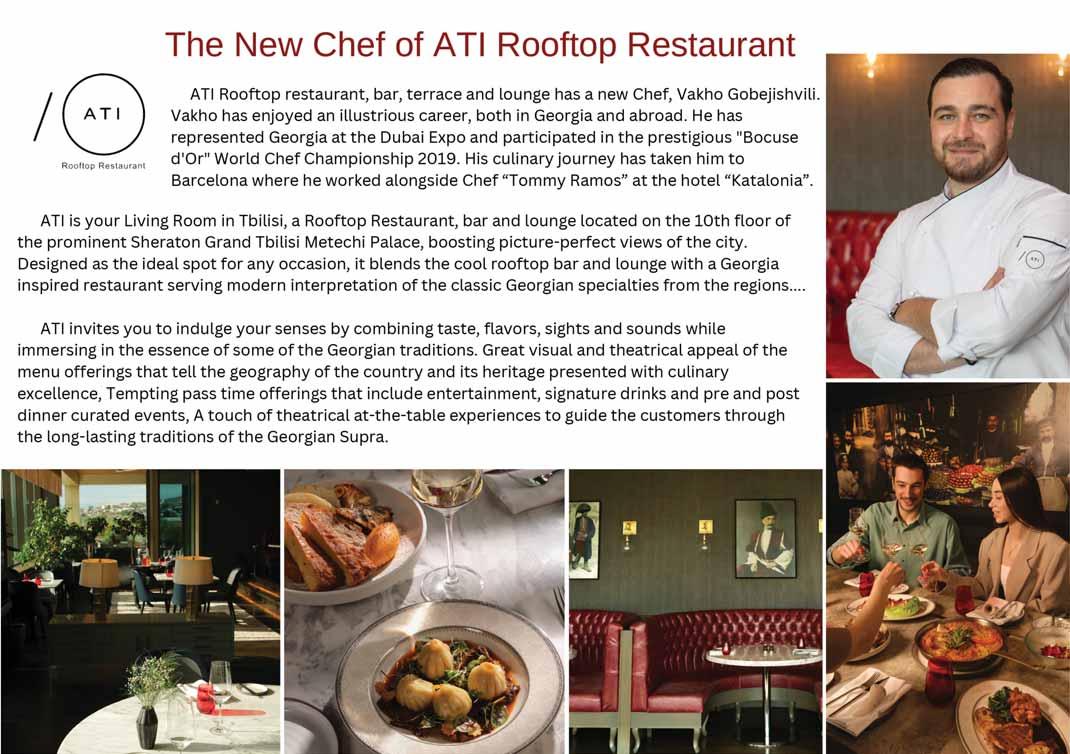
Europe is not only watching how the Georgian government will handle the languishing former President, but also how Tbilisi will handle its relations with Kyiv. If Tbilisi continues to lash out at every opportunity, Brussels is not going to be so inclined to welcome such an entity into the European fold. A deterioration of relations would see Georgia slide even more rapidly towards the Kremlin’s grasp.
Talk of reclaiming the occupied territories of South Ossetia and Abkhazia would cease outright, and a potential for normalization of relations with the de facto governments would slowly begin. Additionally, the estimated over 1,000 Georgians currently serving in Ukrainian military units would likely see their citizenship evaporate almost overnight and much of their property in Georgia either seized or frozen. Their families, who some have already said are being intimidated by the authorities, would be further pressured to give up their relatives.
Succinctly put in a Geopolitical Intelligence Services (GIS) report from March 2023, “the alternative of a stalemate in Ukraine would see the pro-Russian networks in Georgia remaining on top, winning the next election and proceeding to normalize relations with Russia.” Contrary to what the ruling party may want to believe, Ukraine is very much a component of the nation’s own success and development. Indeed, Georgia is intricately tethered to not only the fate of Ukraine in its fight against Russia’s predations, but also to the health of its relationship with Kyiv.
who are desperately buzzing their respective truths into the already-deafened ears of our morally and politically overexhausted people, saying nothing about the commercials, swirling into our imagination with relentless perseverance to make some money to enable our insolvent media to survive.
It is amazing that we the people somehow manage to stay psychologically intact under this much media clank and clatter, perseveringly washing our poor brains. I once made an attempt to calculate the number of the entire Georgian media staff members, including their administrative and service personnel, then I put all of them virtually at work in factories and mills throughout the country, and came to believe that the productivity of this nation all of a sudden had a chance to grow so much that the state budget would feel substantial progress.
B. RUHADZEAnybody who says that democracy, freedom of speech and media plurality is not OK sounds irrational, because this modern-day sociopolitical bouquet is humanly agree-
able and vitally indispensable. Our thanks should go to those who fought for millennia to bring this much good about, from the ancient Greek philosophers to those young men and women in the streets of Tbilisi with loud, albeit naïve slogans in their not-yet-weatheredenough hands.
What seems not quite OK, though, is the irrelevant surfeit of means of mass
communication, operating in this country 24/7 with keen enthusiasm to prove that the other side of the aisle is wrong. Who needs this many media outlets in only a three-and-a-half million population, where the entire media arena reaches, by any stretch of the imagination, only one million consumers, in a $40 million commercial market? Tens of TV and radio stations plus as many print-media
Let’s now put our sarcasm aside for a second and get down to the nitty-gritty of the situation more seriously. In the first place, why is it good for the Georgian people to put up with the existence of hundreds media outlets that are not remunerative? Radio, TV stations and the press are just not profitable. What they do is spend OPM (Other People’s Money). They just spend it. They don’t make it. None of them. In America, for instance, which is our strategic partner and the epitome of socio-political behavior, as well as freedom of speech and democracy for us, no media would survive unless it earns more than it spends. Isn’t this enough of an example to follow?
Our Western friends and allies teach us a lot, and we often take it for granted,
but I don’t know if they are trying to instruct us properly in media matters. I wonder if they think the same way I do. And what I’m thinking is that people have gotten tired of this much political babble from every possible side and direction. If all these media stations have enough readers, listeners and viewers, it means that many able people in this country are not working. We are just reading, listening and watching. And conversely, if they don’t have an adequate number of consumers, what are they doing in the market? Why are they there? There are so many other types of work to do to help us all get fed and clad! And finally, the most important of all those question marks: Is there anybody in the whole world, including our buddies in the West, to help us understand right from wrong and teach us how to prioritize our actions? When I tried to multiply the hours this nation spends in front of their TV sets, irrationally gazing at those mendaciously scintillating screens, I received tens of millions of wasted man-hours that could’ve been translated into productive labor. Several years ago, I experimented in the same way with millions of man-hours spent in street demonstrations and manifestations. The outcome was absolutely analogous. Earlier, I did this with cemeteries, where trillions are spent on building those preposterous grave walls and fences from marble, stone, gravel, cement and iron. What outrageous waste! I sincerely wonder how we manage to provide for our survival if we are misusing and wasting that much valuable time and expensive resource on so many futile efforts. Only with God’s help, it seems!
Continued from page 1
While measures have been taken to this effect – namely freezing the bank accounts and invalidating the travel documents of draft dodgers in extreme cases – an erstwhile Soviet republic imposing stricter mobility protocols on his citizenry risks triggering a chain reaction by fellow neighboring states that can equally ill-afford to harbor displaced and cash-strapped Russians indefinitely.
Much like the Persian Gulf monarchs, the ex-KGB agent banks on a social contract of sorts to keep the public at large politically agnostic and stifle independent thinking. Admittedly, he has not bought their silence with no-show, thumb-twiddling government jobs or by using hydrocarbon proceeds as a slush fund to command unwavering loyalty.
Rather, and somewhat ironically given how hellbent he remains on reviving the Soviet Union, Putin often alludes to the miserable Iron Curtain days as a yardstick of the masses’ comparatively better living standards under his watch. The self-styled tsar’s reign at the helm hinges on preserving the post-USSR status quo vis-à-vis rudimentary freedoms that were withheld by the old guard.
One such perk the younger generation will fight tooth and nail to safeguard is the ability to venture abroad at will.
There is now an unprecedented sense of desperation on the part of middleclass millennials to pack up and flee Russia, not just for fear of enlistment but also owing to the financial distress wrought by Western-led sanctions. It is worth recalling that Putin first assumed office on the premise of redressing his predecessor’s gross mishandling of the domestic economy and by extension, restoring long-lost national pride at the turn of the twentieth century. Incidentally, his claim to fame is fast coming undone as ordinary citizens find themselves bearing the socioeconomic brunt of their commander-in-chief’s bloodlust.

Georgia’s “infinite hospitality” tagline at ITB Berlin earlier this year was nothing more than a euphemism for rampant Rus-
sophilia which runs deep at the state level.
The ruling Georgian Dream party continues to peddle the fallacy that incoming Russians oppose the war, when the bulk of them are simply anti-conscription sellouts who will do or say just about anything to avoid being thrown into the meat grinder. Those evading their call of duty have no qualms about denouncing Russia’s barbarism once they are out of the woods, and even demonstrate solidarity with Ukraine for the sake of blending in. Sadly, the Georgian populace has overwhelmingly bought into this charade and contented themselves with pure showmanship over resisting mass migration from an aggressor state.
In stark contrast to the flak the so-called “foreign agents” bill drew from Georgia’s inhabitants, there has been little pushback against the no-questions-asked admission of more one hundred thousand Russians into their country since the full-scale invasion’s onset. Despite the fact that Georgian commoners are being uprooted from their dwellings as a result of the bidding war they are now in with these newcomers, the administration has failed to fortify the porous border through which recurrent waves of hooligans, crypto scammers and intelligence operatives from a supposed adversary infiltrate Georgia unabated. Worse still, the overrepresentation of a single community and consequent shortage of accommodation is squeezing out immigrants from other backgrounds with greater purchasing power.
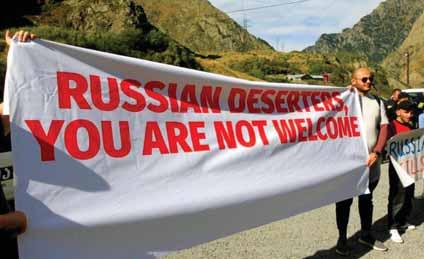
Tbilisi has taken to the school of thought that appeasement breeds pacifism, when in reality the opposite holds true. The Kremlin now has carte blanche to implant its foot soldiers on Georgian soil and russify the country to such an extent the capital, as well as the coastal city of Batumi, no longer boast an inherently European flair but instead an eerie, gulagesque ambiance where Russian has become the lingua franca. To his credit, Putin could not have picked a more opportune juncture at which to offer the tiny Black Sea nation an olive branch. His kiss and make up escapade, which comes against the backdrop of severely ruptured ties between Georgia and the European Union, is not mere happen-
stance so much as a covert attempt at exploiting ideological fault lines within Georgian society.
The current establishment, which tacitly operates in the garb of a Westernstyle democracy, has its fair share of internal saboteurs who will stop at nothing to derail Georgia’s European Perspective. Prime Minister Irakli Garibashvili, along with party head Irakli Kobakhidze, have become something of local poster children for Euroscepticism, often parroting the Kremlin’s key talking points and outlandish conspiracy theories on the EU and Ukraine. At the same time, the resumption of direct flights to and from Russia will almost certainly be characterized by one-way traffic and further exacerbate Georgia’s cost of living crisis. The Georgian leadership is essentially doing Vladimir Putin a huge favor by taking in the undesirables he was keen to offload anyway, and even branded as ‘national traitors’ for refusing to take part in the war.
THE BALTIC BLUEPRINT President Salome Zurabishvili’s plausible deniability when it comes to being in the dark over pro-Russian initiatives championed by members of her cabinet is now par for the course. The Georgian people are starting to see through the
gross malfeasance committed by senior officials, who have deliberately stymied their pathway to EU accession. Being denied candidate status last June was largely a by-product of Georgia’s soft spot for the Kremlin, above and beyond other deficiencies cited by Brussels. Existing sticking points, from press freedom and de-oligarchization to judicial overhaul and the groundless incarceration of Mikheil Saakashvili, pale in comparison to the lifeline Tbilisi has thrown Moscow in its hour of need. By seeking to have it both ways and reducing the nation to little more than a pawn on Putin’s chessboard, the Georgian government only has itself to blame for ending up in the Western doghouse.
Both Europe and the United States view this brewing rapprochement through a zero-sum lens, such that normalized Russo-Georgian relations and the latter’s strategic partnership with the collective West cannot go hand in hand. Contrary to the likes of other rogue actors such as Turkey or the United Arab Emirates, Georgia does not have the bandwidth to get away with playing a double game.
Recently re-elected Turkish President Recep Tayyip Erdogan has repeatedly used the ten million, Europe-bound Syrian refugees stranded in his country as a bargaining chip to extract concessions
and funds from Brussels. Meanwhile, the Emiratis have mastered the art of lobbying the State Department and its transatlantic satellites to look the other way insofar as gross human rights violations as well as coalescing with pariah states are concerned.
Perhaps what is most mind-boggling, from the Eurocrats’ vantage point, is that Georgia has made a wilful decision to take a leaf out of the Belarusian playbook in becoming a de facto exclave of the Russian Federation as opposed to emulating the Baltic states’ tried-and-tested template. Had the Georgian Government shown some initiative to curb inbound arrivals from Russia, much less implement a full-fledged visa ban as Lithuania, Latvia and Estonia have done, they would have been on an entirely different trajectory with respect to EU integration. The short-term material gains from positioning itself as a sanctions circumvention hub have proven far too lucrative for Tbilisi to try and rock the boat, however much this cosmetic windfall undermines national security and unity. The Baltics, by contrast, have not let profits trump principles, and perceived the ongoing conflict as a cue to entirely wean themselves off a failed state in the making.
Mending fences with an existing occupier is tantamount to glorified capitulation, irrespective of the hollow soundbites we hear every now and then by closet Russophiles masquerading as public servants on 20% of Georgia’s land being annexed. Taking aim at Russian passport holders by constraining their travel privileges will prove the ultimate deathblow to Putin’s already collapsing regime, which just withstood the Wagner mutiny saga. Needless to say, the Baltic trio were among the first EU member states to clock this panacea and walk the walk. At the same time, they swiftly ramped up border protection as a means of preempting state-sanctioned human trafficking from both Russia and Belarus. Unless the Georgian Dream Party follows suit and reorients itself in earnest with the free world, it is only a matter of time before the country’s upper echelons are given a reality check by their increasingly disgruntled voter base and put out to grass.
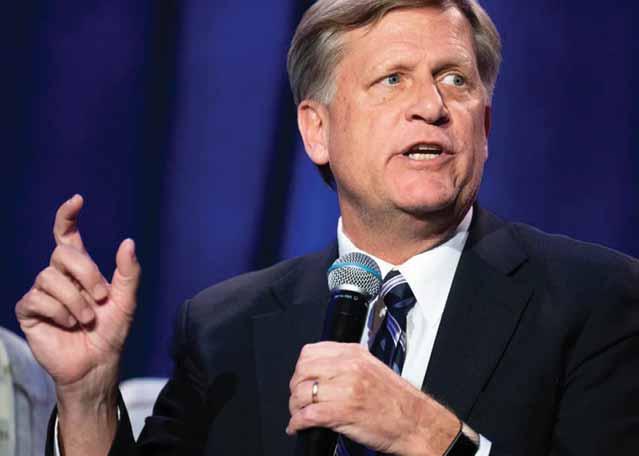
sians. And therefore, this excuse that Russians are not guilty and they shouldn't be sanctioned because of autocracy - I disagree with that.
ALSO, FOR A 142-MILLION COUNTRY, THERE WEREN’T EVEN 14 MILLION PEOPLE IN THE STREETS PROTESTING THE WAR. Well, initially, there were some very brave people that did protest. But repression works.
Of course, when you arrest people, when you give my friend Vladimir KaraMurza 25 years in jail for saying something slightly critical of the war, it's very rational not to go out and protest. If I were a Russian citizen, I'm not sure I would be brave enough myself to go and protest against Putin, facing the specter of going to jail for 25 years. But that doesn't tell us what people believe. I don't think we should assume, just because we're not seeing those protests now, that there's massive support for Putin's war.
enhance its security. And that will be true when that happens. Right now, Ukraine is receiving weapons from NATO and is an importer of security from NATO. But after this war is over, Ukraine will begin to build the most qualified, modernized fighting force in all of Europe. They're already on that path today. And down the road, Ukraine will be a net exporter of security to the NATO alliance, not an importer; they will be providing security, especially for small countries in the neighborhood; they'll be providing security for Estonia and Latvia and Lithuania and other countries that don't have the military capabilities that the Ukrainian Armed Forces will have, especially now that they're on the path of switching over to platforms from the West and getting rid of all that Soviet junk they've had to fight with in the past. I think that is a conceptual change that not a lot of people understand, but I think should be part of the debate in Vilnius.
INTERVIEW BY VAZHA TAVBERIDZEMichael McFaul is an American academic and diplomat who served as the United States Ambassador to Russia from 2012 to 2014. Prior to his nomination to the ambassadorial position, McFaul worked for the US National Security Council as Special Assistant to the President and senior director of Russian and Eurasian affairs. Radio Free Europe’s Georgian Service discussed with him the Prigozhin rebellion and Putin, the upcoming Vilnius Summit, and Ukraine and Georgia’s chances for EU and NATO accession.
We still don't know the full consequences. There are a lot of mysterious things that I would like to have answers to. But if you think about Putin’s strength within his country, and with his military and his commanders a week ago versus now, he's emerged from this crisis in a much weaker position. Anytime there's a mutiny against you, or anytime there's the specter of civil war, that was his phrase, not mine, it suggests you're not fully in control of what's happening inside your country.
When the mutiny was underway, moving very easily to Rostov and toward Moscow, Putin made a very dramatic speech, calling them traitors, and saying he would use all means necessary to squash their rebellion. And yet, when push came to shove, he didn't do that. He didn't escalate. He didn't double down. He didn't use massive military force: He negotiated with them. The assumption about the war in Ukraine is always that Putin is a tough guy, that he will escalate if you do too much. If we send them tanks, he's going to escalate; if we send them Patriots, he's going to escalate; if we send them fighter jets, he's going to escalate. And now you hear that we don't want to send certain long range missiles, ATACMS, because Putin will escalate. I don't know what he'll do in Ukraine and I don't pretend to know, but this case study of escalation, he had
the opportunity to escalate, he had the military means to do so, but he didn't. And that is a very important lesson for those countries supporting Ukraine: instead of assuming escalation, maybe assume he’ll capitulate? Maybe he'll negotiate when faced with the chance of losing the war in Ukraine. The other lesson is he hasn't yet figured out is how to deal with Wagner. I was very struck that we were told by Mr. Peskov, his press spokesperson, that this was going to be a major speech. And what was it? A speech delivered to the Wagner mercenaries? So strange, if you think about it - a national address, and the only audience that he's talking to are these hired guns? And his main message was: “Your leaders betrayed you. They deceived you. Split with them and come to me.” And that suggests they haven't done that yet. And from what we hear, there weren't many Wagner fighters that took the offer to join the Russian conventional forces. So that means he still hasn't fully resolved how he deals with these fighters.
“SO LONG AS PUTIN RULES RUSSIA, STRATEGIC PARTNERSHIP IS IMPOSSIBLE”

– YOU WRITE IN YOUR MEMOIRS, ‘FROM COLD WAR TO HOT PEACE.’ WHAT KIND OF RELATIONSHIP WILL BE POSSIBLE WITH PUTIN’S EVENTUAL SUCCESSOR?
It's a very complex question and a very legitimate debate in academia. Are there these structural forces that cause countries to behave in a certain way, or do individuals matter? I think that individuals matter and regime type matters. I think autocracies behave in the world in one way, and democracies behave in the world in a different way.
I've changed my views since writing that book. I do not see continuity in the way that Russia has behaved to the outside world. There was no continuity between Brezhnev and Gorbachev: Brezhnev dealt with the uprisings in Eastern Europe by invading in 1968, but when Gorbachev was faced with similar choices in 1989, he said “go your own way.” If Russia as a country and Russians behave the same way all the time, Gorbachev would have invaded Germany when there were uprisings. He didn't.
Similarly, Yeltsin didn't behave the same way that Putin is behaving today. Yeltsin declared independence from the Soviet Union and worked to bring about the dissolution of the Union, as did leaders in Georgia, Ukraine and the Baltic states. Remember, Putin was a completely accidental leader of Russia. There was no groundswell of support; there was no Putin movement in 1999 and 2000. He was a creature of the existing regime. He wasn't an opposition leader. He wasn't with the communists or with Zhirinovsky. Yeltsin appointed him Prime Minister. And then Yeltsin appointed him Acting President, and the people of Russia ratified that choice afterwards. Putin wants you to believe otherwise, right? He wanted to create this myth that there was the chaos of the 90s, and he came in as the hero - that's complete and utter nonsense. That's not the history the way it was in real time. Yeltsin originally wanted to choose somebody else: Boris Nemtsov, the heir apparent, and then something interrupted that plan- it was the 9th of August 1998, the financial crash, when the government which Nemtsov was in had to be thrown out because Russia was then a quasi-democracy. Imagine Yeltsin appointed Boris Nemtsov as his heir apparent, the Russian people would have ratified that just like they ratified Putin, because they controlled that election rather comprehensively. There's no doubt in my mind that the history of Russia's relations with Georgia and Ukraine and my country would have been radically different had Boris Nemtsov been elected president at that time. So that suggests to me that there's an interplay.
We don't necessarily know if Russians support Putin. How can you know when there's no real free and fair elections, when there's no real media? But having said that, I changed my views as a result of this horrific, barbaric war in Ukraine. Because Putin made the decision to invade Ukraine. There was no vote, no referendum. We don't know what Russians actually thought about it. But once he went in, there was support as there usually is when countries go to war. And now, there are Russians raping Ukrainian women and children. There are Russians committing massive atrocities inside Ukraine. Putin can't do those things without the support of the Rus-
I think there are three categories in Russia: the hardcore supporters, some 25 -35%, the ones watching the Russian national television stations controlled by Putin. These tend to be older people, more rural, less educated, and less wealthy. Then there's a smaller group of Russians, 20%, who don't support this war at all, or Putin. They don't watch televisionthey get their news from the internet, media, Telegram, from Navalny live, from Dozhd. They're younger, urban, better educated, richer. In other words, the future of Russia. They're not with Putin's project at all. And then in the middle, there's what the Russians call the boloto – the swamp. That's where most Russians are. And they support Putin because he's Vlast - because he's the power. He's the President. They've known nobody else for a quarter of a century. But do they enthusiastically support him and the war? There's little evidence for that.
ON TO THE VILNIUS SUMMIT. THE ALLIES HAVE STATED THEY CANNOT INVITE A COUNTRY TO NATO THAT IS STILL AT WAR. WILL NATO INVITE UKRAINE IF IT LOSES? OR IF THERE IS A FROZEN CONFLICT?
There is no enthusiasm at the Vilnius Summit to lean too forward, because Ukraine is at war. And remember, all the NATO countries are democracies, they're not dictatorships, so they have to listen to their people. And I understand the argument that I hear from officials in the Biden administration that say the American people wouldn't support bringing Ukraine in right now, while they're at war, because they think - erroneously, I think, it's more complicated than that - that it would mean we would have to go to war with Russia. There’s no appetite for that among the American people. That said, I hope that in Vilnius there will be a much stronger signal about the path for Ukrainian membership to NATO than there's been in the past. Since the Bucharest Summit and the convoluted messages for Georgia and Ukraine, since Putin invaded Georgia, the serious conversation about both Georgia and Ukraine has been frozen. And we've done nothing. And the fear was always, “oh, if we do something, Putin is going to respond, he might invade Ukraine.” Well, guess what? Since Bucharest, he's invaded Ukraine twice, and Georgia once! So I think that argument has to be retired forever, that this somehow is going to be a provocation. We didn't expand NATO, and he invaded anyway. And we've got to get ourselves around to rethinking who is providing security for whom in the Ukraine-NATO relationship. The old conventional thinking is that Ukraine needs to join NATO to
Ukraine will be a critical partner in enhancing our deterrence, visa vie Russia, for all of the NATO alliance after the war. And about frozen conflicts, I think that argument also needs to be retired. I hope this war ends with unified borders in Ukraine, the 1991 borders, but if, God forbid, it doesn't in the short run (and Zelensky himself and the people of Ukraine are the ones that need to make that decision, not me, and not President Biden sitting in Washington or anybody else), if somehow it settles into a frozen conflict, that should never again be used as an excuse to say, “they can't have NATO membership.” The analogy is West Germany in 1955, when they joined the Alliance. The borders were unsettled, but we found it in our interests to stabilize the setting there and long term create the conditions for unification. If, tragically, Ukraine’s future borders are not the 1991 borders, the goal for Ukraine has to become a thriving capitalist economy, a thriving democracy, and you need security for that. And one day, their success will be what compels people on either side of the border to rejoin and reunite, just like we saw in Germany in 1989. And so that needs to be the goal. And NATO membership is a part of reaching that goal.
NOW ONTO GEORGIA.
AT THE 2008 BUCHAREST SUMMIT, UKRAINE AND GEORGIA WERE CONSIDERED A TANDEM. WHERE ARE WE TODAY WHEN IT COMES TO NATO AND GEORGIA?
I would go even further and say that in 2008, Georgia was a leader, ahead of the Ukrainians, leading both in argumentation and preparedness. Georgia’s society was much more enthusiastic about joining NATO. It's tragic to see how that's changed. When the EU announced that Ukraine and Moldova would be on a path to joining the Union, and left Georgia out of it, that, to me, was a tragic signal of how Georgia has fallen behind. I think Georgia is a European country, and has shown that it can be a democratic country in a thriving market economy. In the past it did some fantastic reforms. It was a leading example to the entire post-Soviet world. I remember those days, when everybody was flying to Georgia, to learn about what it had done to achieve a post-communist democratic breakthrough. But that momentum has stalled. And I hope that that forces inside Georgia, in cooperation with institutions like the European Union, can get it back on track.
Solomiia Bobrovska, a Ukrainian politician and civic activist who has served as a member of the Parliament of Ukraine since 2019, and was Acting Governor of Odesa Oblast from 2016 to 2017, sat down with Radio Free Europe’s Georgian Service to discuss Georgia’s third and very captive president, Mikheil Saakashvili, and her president’s latest demand for his release.
“Mikheil Saakashvili is a Ukrainian citizen,” she begins by stating. “And you've likely seen our President Zelensky’s statement? That's the first time in our common history, when an ambassador was sent back to figure out the next steps. And can Georgia explain the conditions of bringing Saakashvili back to Ukraine as he is a Ukrainian citizen? Because we saw the conditions they have him in, they are abnormal. For me, as a person who has known him for years, it’s very painful to see him this way, and I think President Zelensky had the same reaction. We all support the reaction of President Zelensky, and his decision to demand and bring Saakashvili in any possible way back to Ukraine, so we can give him the proper, needed medical support, just to save his life.”
ZELENSKY’S STATEMENT
ACTUALLY UPSET QUITE A FEW PEOPLE IN GEORGIA, MOSTLY IN THE PROGOVERNMENT CIRCLES. HE WAS ACCUSED OF INTERFERING IN THE DOMESTIC AFFAIRS OF GEORGIA. WHAT WOULD BE YOUR ANSWER TO THAT?
It’s painful to see what is happening to the Georgian government, not only because
of Misha, but also because of the war. Georgia’s was one of the few parliaments in the world who refused to allow President Zelensky to make a speech. Then we see regular flights to/from Russia, we see the arguments about Ukraine and NATO.
So, it’s no surprise what they say about Saakashvili. But he, once again, is a Ukrainian citizen, with a Ukrainian passport. And we will insist that he is returned to us, so that we can save his life. You’ve seen the condition he is in, it’s frightening. He is being treated worse than Russians treat prisoners of war, and that should tell you something. And so, I'm not sure that we care about some Georgian politicians being upset. What we see is that Georgia is moving in the same direction Yanukovich was leading us back in 2013, when he was trying his best to firmly place Ukraine under Russia’s umbrella. The Georgian government has sadly chosen the same way. We see the big gap between the government and the people – we see the Georgian volunteers fighting here, on the frontlines, we see Georgians supporting us and we appreciate it a lot. But we cannot accept what their government is doing – I fear that after 15 years, Georgia started to forget what Russia did to it back in 2008 and in 1991-94.

WHEN YOU SAY YOU WILL CONTINUE TO INSIST THAT SAAKASHVILI IS GIVEN BACK TO UKRAINE – WHAT LEVERAGE DOES KYIV ACTUALLY HAVE TO PERSUADE THE GEORGIAN DREAM TO HAND SAAKASHVILI OVER?
You know, I was surprised when Zelensky made that statement, I didn’t suspect he’d opt for such a radical approach. In diplomatic language, when you send back an ambassador for consultations, it means a lot and it’s never happened between Ukraine and Georgia before.
That means Kyiv things there is no point holding back anymore, that the line has been passed. And I think the President and his office will continue to find ways to bring him back, despite all the other things that are happening here, the war and so on.
IN THAT STATEMENT, HE ALSO SAID THAT “RUSSIA IS KILLING A UKRAINIAN CITIZEN AT THE HANDS OF THE GEORGIAN AUTHORITIES.” THIS ECHOES EARLIER REMARKS BY SAAKASHVILI WHEN HE SAID HE WAS BEING SLOWLY
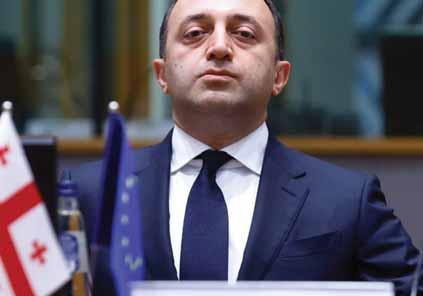
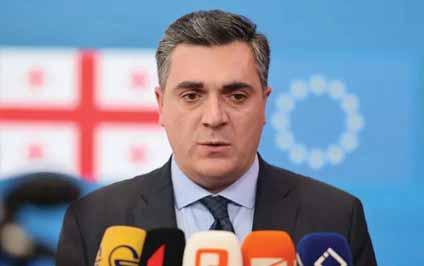
Georgian Foreign Minister Ilia Darchiashvili on Wednesday said Georgia would continue to back Ukraine “to the best of its ability, as we have done so far.”
“We actively assisted Ukraine from a humanitarian, political, and diplomatic point of view; this is our obligation and shows respect for our partner. No careless behavior towards us can change that,” he continued.
The FM asserted that “everything is clear regarding former President Mikheil Saakashvili, and Ukraine’s decision is baseless.”
“Friends don’t deserve such treatment. We will undoubtedly have an opportu-
nity in the future to debate these matters in bilateral formats, but for now, we choose to stick with our stated stance. We won’t respond to this,” he continued.
On July 3, Ukrainian President Volodymyr Zelensky called on the Georgian authorities “to hand over Ukrainian citizen Mykhailo Saakashvili to Ukraine for the necessary treatment and care.” He also urged partners to address this situation and “not ignore it, and save this person.”
Georgian MFA responded to the statement, deeming it “a severe form of diplomatic escalation, and it is terrible that Kyiv is taking this move against a friendly state and people.”
KILLED ON PUTIN’S ORDERS. WHAT’S YOUR TAKE ON THAT?

It's very obvious that Misha has become a big threat for Russia. He brought a totally pro-Western policy to Georgia and Ukraine, to this day, isn’t at the reforms standard that he brought to Georgia. He is a symbol that is a complete opposite of what Russia is trying to impose on Georgia. He is part of the system that has to be destroyed. We all know Misha – he is complicated, difficult, unpredictable, and so on. But he is a phenomenon in the post-Soviet world, and it’s not strange at all that Russia would seek to have him destroyed, when
it finally got a chance to do so. To me, it's very obvious.
AS A MEMBER OF THE NATO PARLIAMENTARY ASSEMBLY FROM UKRAINE, AND WITH THE VILNIUS SUMMIT AT THE DOOR - WHAT IMPACT DO YOU THINK THIS INCIDENT WILL HAVE ON GEORGIA’S NATO ASPIRATIONS? HOW EFFECTIVE A CALLING CARD IS THIS TO KNOCK ON BRUSSELS DOOR?
I think it will take years and years to become what Georgia was 10-15 years ago, when it really was way ahead of Ukraine on its path to join the EU and NATO. Now Georgia’s government claims they’ve fulfilled all the criteria. It's very artificial. Sadly, I don’t believe it is going to be a fast-track process for Georgia, and don’t believe that it’s going to happen while that Russian oligarch is controlling the entire state. The EU and NATO can see very clearly what is happening to Georgia.
SUPPOSE, UNLIKELY AS IT IS, THE GEORGIAN GOVERNMENT ACQUIESCES TO KYIV’S REQUEST AND HE’S RETURNED TO UKRAINE. WHAT FUTURE WOULD HE HAVE THERE? CAN HE STILL HELP UKRAINE?
First of all, he has to pay attention to his medical rehabilitation and his health, that goes without saying. I think he has a future in Ukraine, and that he can help Ukraine, because he really knows the style of Russian warfare, the Russian logic, and we are in one basket. As a Georgian, he knows very well how Russians behave on the world stage, in international politics. He is also well aware how to talk to the key players in the world, to Germany, France, Netherlands, Italy and, finally, how to make Ukraine the 33rd member of NATO.
During the last two years, we have had a strong, 10% economic growth, – the Prime Minister of Georgia, Irakli Garibashvili, said while presenting the annual report to Parliament last week, noting the country’s economy grew by almost 30 billion GEL in three years.
“I would like to tell you in more detail about our activities. I would start with an overview of the economy in general. For the last two years, we have had strong economic growth, 10% economic growth.
I also want to say that just two years ago, the country’s economy, gross domestic product was about 50 billion GEL, in 2021 it was 60 billion, last year it was 72 billion GEL, and this year we expect that the gross domestic product of the whole country to be about 80 billion GEL.
“During three years, the economy of our country grew by almost 30 billion GEL. This figure will be 8,200 dollars per capita this year. We remind you that three years ago, in 2020, the gross domestic product per capita was about 4,500
dollars. I would also like to note that the so-called external vulnerability was decreased. Last year, the account deficit in relation to GDP improved by 6.3 percentage points and equaled the histori-
cal minimum – 4.1%. If we compare the deficit of the current account in relation to the GDP in 2012, which was 2 times higher, we have made significant progress,” said the Prime Minister.
code laws, such as:
• Maternity leave rights;
• Anti-discrimination laws relating to Sex, Gender, Race etc.;
• Laws relating to dismissal, including rights to vacation pay and severance pay;
• Ability to benefit from a company´s internal working rules.
In order to understand if a contractor is actually an employee, a number of factors are used to make this determination, including (at least a few of these have to be satisfied in the determination of status):

Does the individual have a boss?
Does the individual perform tasks and is compensated for each task or are they compensated on a weekly basis?
Does the individual use company servers, email addresses, computers and office space?
Is the individual required to attend company video or in-person meetings?
Are there working hours?
In Georgia, there are lot of foreign IT companies that take advantage of laws relating to hiring foreigners. For each foreigner, the IT company has to show over 50K GEL (about 20K USD) of revenues per year to be eligible for big tax incentives. If the revenues are not significant, it becomes a reason for them to want to show a lower headcount. Frequently, foreign IT companies with Georgian subsidiaries have little or no revenues in Georgia, but rather use local staff to create software and the like for head office. This is particularly challenging for foreign IT companies that transfer their staff from other countries, as it makes it less attractive to do so and more attractive to hire locals. If the foreign company is a public company, very strict compliance laws would require subsidiaries to follow local laws very carefully.
This is the first article in a series of articles relating to Disguising Employees as Contractors.
This is a follow up to our recent article relating to tax rates (see Legal Insights with Klein Law: 1% Tax Rates for Entrepreneurs and Other Georgian Attractive Tax Rates - Georgia Today).

There are many reasons to disguise employees as contractors, including most importantly savings on Taxes (20+% v. 1%) and ease of hiring and firing.
Georgian employment laws are quite
strict and fairly complicated. They follow standards set out by the ILO (International Labor Organization). Typically, in cases where the employer tries to avoid hiring, there is a disproportionate balance of power between the parties, and, as a result, we encounter more vulnerable, unstable forms of employment, a labor force without a labor code and social guarantees. Due to this disproportionate balance of power, employees are very rarely in a position to negotiate on an arms-length basis with employers and are usually happy to have a job offer at all. Further, the attraction of low taxes
is a strong incentive for employees to be classified as an independent contractor; perhaps they assume that if proper taxes are paid, that the compensation would be reduced.
If the employee is disguised as a contractor, both employer and potentially the employee could be guilty of criminal tax evasion and the penalties and back taxes.
Employees enjoy many rights that bonified independent contractors do not, namely:
• Pension benefits;
• Ability to benefit from Georgian labor
Are there company business cards?
The length of the relationship is also a factor.
A wrongly classified employee who is wrongly dismissed can potentially sue their employer and receive compensation for the time the lawsuit takes to process (at times, several years). Since employees are usually unfamiliar with Georgian labor laws, they are often not aware of their rights. Even more important is that a company could be ordered to re-instate a worker as an employee which could be very uncomfortable, especially for estranged contractors
Our next article will discuss the issues relating to intellectual property created by contractors who are actually employees, and the highly toxic potential consequences of potential strike suits against IT companies in particular.
The Asian Development Bank (ADB) will invest 20 million lari (around $7.6 million) in Tegeta Motors Limited Liability Company’s (Tegeta) inaugural 2-year and 6-month lari-denominated green bond, the first-ever such issuance on the Georgian Stock Exchange. Proceeds will finance the deployment of zeroemission light, road, and non-road electric vehicles (EV), and an expansion of Georgia's EV charging network by 70 new stations.

“ADB is Asia and the Pacific’s climate bank, and this investment builds on our commitment to developing Georgia’s capital markets through our climate and gender bond issuance,” said ADB Director General for Private Sector Operations Suzanne Gaboury. “This is Georgia’s first local currency-denominated approved green bond, and we expect it to spur further green bond issuances in Georgia and throughout the South Caucasus."
Green bonds are innovative financial instruments that promote transparency and accountability to investors, particularly in local currency. The proceeds are used exclusively to finance or refinance, partially or fully, new or existing projects with environmental or climate-related benefits. Tegeta’s bond issuance is aligned with the International Capital Markets Association’s Green Bond Principles while Sustainalytics provided SecondParty Opinion on the credibility of the bond issued.
“Tegeta is dedicated to pioneering the issuance of lari-denominated green bonds to support Georgia’s efforts to reduce greenhouse gas emissions and transition toward a more sustainable transport
sector,” said Tegeta Executive Director Vakhtang Kacharava. “This issuance reaffirms our commitment to environmental responsibility and sustainability, and actively contributes toward a climatefriendly future. We are thankful for ADB’s support and assistance and are looking forward to continued collaboration with
ADB in climate-themed investments.”
The investment was funded through ADB’s issuance of the first supranational local currency green bond in the Georgian domestic market with a matching amount and tenor. The ADB bond was completed and certified under ADB’s Green and Blue Bond Framework, its
issuance was arranged by TBC Capital, and it was issued and settled through the National Bank of Georgia’s Georgian Securities Settlement System.
Tegeta, established in 1995, is Georgia’s leading automotive products and services company with over 400,000 registered retail, 40,000 corporate, and 3,000
wholesaler clients through 28 service centers across the country.
ADB is committed to achieving a prosperous, inclusive, resilient, and sustainable Asia and the Pacific, while sustaining its efforts to eradicate extreme poverty. Established in 1966, it is owned by 68 members—49 from the region.
Aiding the economic empowerment of women requires both financial and informational resources. The USAID program "Supporting Youth and Women's Entrepreneurship in Georgia" (USAID YES-Georgia) has been actively supporting women entrepreneurs for years.
USAID YES-Georgia’s latest information campaign "Become a successful female entrepreneur," within the framework of the program, took place last weekend (June 30-July 3). Within the framework of the campaign, representatives of the program met with women living in the Kakheti region and provided them with information about the campaign's activities and the development of entrepreneurial activities.
The campaign "Become a successful female entrepreneur", which is carried out within the framework of one of the components of the USAID YES-Georgia program - Buzz Georgia, involves conducting trainings for women living in the regions, sharing knowledge and experiencewith them, and helping them in their economic and entrepreneurial activities. The first such event was carried out in April 2021.
The ongoing campaign in the Kakheti region includes around 100 women living in Sagarejo, Sighnaghi, Gurjaani, Telavi and Akhmeta who run family wine cellars, a traditional craft workshop, a farm, wheat meadows, almond orchards, a family hotel, and a sushi bar. USAID YES-Georgia campaign representatives
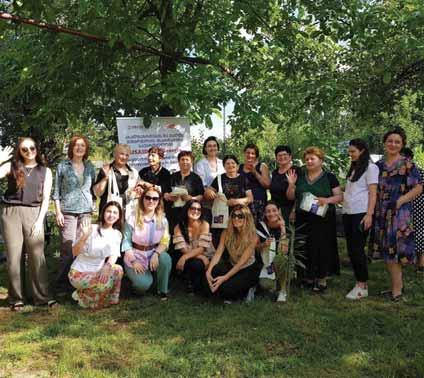

visited 12 female entrepreneurs who are beneficiaries of the program, and seven of them hosted total of 90 local women to attend informational meetings about women's entrepreneurship provided by program representatives.
“My wine cellar is called ‘Doctor's Bio Winery,’ where I’ve been producing Kvevri natural wine since 2020 from my own vineyards planted in the microzone of Akhasheni,” Marina KakiashviliRuadze tells us. “We are focused on the production of premium quality wine.
I’m a member of the Natural Wine Association and have participated in many

local and international exhibitions, and my wine is a prize-winner. Last year, I received a USAID grant, and the equipment I purchased with it helps me to keep up the quality of my natural wine. Last weekend’s campaign was a motivation for all women entrepreneurs, and I was glad to be a part of it.”
“What would you do if you had a 19th century wine cellar, vineyards, and free land near Lopota Valley, one of the most attractive tourist spots in Kakheti? Of course, you would think about starting a hotel business, and that’s just what I did in 2018,” Maya Mosiashvili of the
Lopota Kari family hotel says. “I started by sending my business idea to the Produce Georgia micro and small grants program. The funding was small, but enough to motivate my husband and I to try our hand at hospitality. We opened a 5-room hotel in the fall of 2019. Along with the hotel business, my husband and I also started producing wine, which we make from our own organic grapes in our 150-year-old cellar.
“I learned about the USAID YES-Georgia women's entrepreneurship support program during the pandemic and joined the trainings they organized, which helped me a lot to move my business forward. I got a lot of support from the wonderful team. Knowledge and expertise are very important for start-ups, especially for women who have much less time and financial resources to develop a small business. It’s can be easy for women to start a small business, but much more difficult for them to develop and grow it, because it requires increasing your skillset and raising funds. I hope the program will continue to support and strengthen women's businesses in the future.”
“My wine cellar ‘Karseladze's Cellar’ was built in 1902 and has the status of a cultural heritage monument,” says Salome Matiashvili. “There are many old things, which will take ourguests back in time. I also make two kinds of kvevri wine-Rkatsiteli and Saferavi. I produce wine and fruit chacha, as well as brandy. Participating in Young Entrepreneurs’ School established within USAID YES-Georgia program, was a great challenge for me, I saw my business in a completely different way, I started managing it very seriously, which
was encouraged by their trainings.“
“Since 2019, my company Traditional Churchkhela from Kakheti has been producing several types of churchkhela,” says Mariam Kevkhishvili. “The product's main ingredient is grape juice, which wesource from our own vineyards, which allows us to control product quality. In 2019, we planted almond plantations in the Gurjaani region, which are already giving us a good harvest. Last weekend’s workshop was an informational meeting, very useful for local women looking to raise awareness about their work.”
The program is implemented by the Crystal Foundation with funding from the American people, USAID, and the Women's Global Development and Prosperity (W-GDP) initiative. The project is provided additional financial support by the microfinance organization Crystal.
By 2024, it is expected that more than 2600 women entrepreneurs within the program will have better access to knowledge, finance and business services, enabling them to transform their businesses into more profitable enterprises.
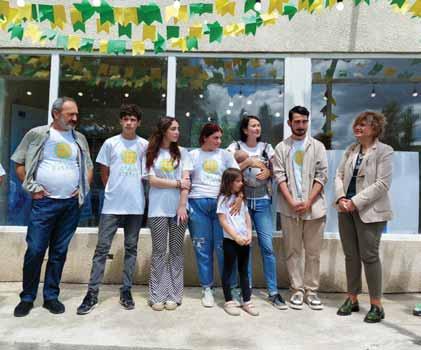 BLOG BY MARIAM AVAKOVA
BLOG BY MARIAM AVAKOVA
Today, I am going to share an inspiring story and a symbol of how one person can change perspectives in a village and create space for youth. Kvemo Chala is a small village near the Kaspi region with only one stadium for sports activities. Before 2018, Kvemo Chala had no perspective, local or international, for youth. Then, in 2018, the youth-based organization “Kona” was founded by Czech enthusiast and youth engagement and community building young professional Jana Kowalova. In Kvemo Chala, Jana is known as the village’s “Czech daughter-in-law,” one who brings change to a small rural area with a ton of ambition and courage.
I think even Jana could not have imagined her life would be changed this way, coming from an EU city to a small Georgian village, after she met a Georgian boy originally from Kvemo Chala. Full of enthusiasm and ambition, Jana noticed
the inequality and lack of leisure activities among the local youngsters, and, with her EU perspective and her previous experience in youth work, she established the organization “Kona.”
Jana and I met for the first time in 2018 when she organized a networking event, ‘Be Involved. Youth Work in Georgia: A Workshop on Networking and Sharing Experiences on Youth Work in Georgian Regions,’ where I was honored to be invited as an active young leader in my country and as a young stakeholder. Since then, I've followed Kona. During the pandemic, I met Jana in Kvemo Chala, in her new house, where she was hosting a Komli NGO Kaspi tour. She told me her dream had been to open a Kona Youth Center, and with approximately 10 volunteers from Kvemo Chala, she is now able to conduct different activities there, like painting lessons and soft skills training. This is the first time that Kvemo Chala has received a spark of hope for fostering local youth opportunities.
In Georgia, meaningful youth participation is crucial, because it enhances the young generations' feeling of ownership and commitment to the community, which leads to beneficial changes in the country and in rural areas. Youth voices must be at the center of decision-making for their own future, whether in their own country or throughout the world. Youth participation can boost academic achievement as well as social-emotional well-being. It assists young people to develop valuable employment skills and networks, which can serve as an opportunity for social adaptation.
During pandemic, I joined the Be Involved training program co-financed by the Polish-American Freedom Foundation as part of the RITA "Region in Transition" Program implemented by the Education for Democracy Foundation. It opened up new possibilities in
my mind, and even I was able to make a small contribution by offering a light mentoring session to one team. It was so special to see how one person full of ideas can change perspectives for youth and work on unlocking youth skills. During this time, I became friends with one volunteer from Kona who was part of the training program, Tako Batilashvili.
During the opening ceremony of Kona on June 21, I was full of joy to see how the green ribbon was cut by volunteers and UNDP and EU representatives together. I can say this was an example of the first step to an inclusive atmosphere for the Kvemo Chala young generation.
I had a conversation with Tako, who said that she had grown up in a village where no opportunities existed, but when Jana came to the village and established Kona, she was full of curiosity and eager to be involved.
Tako was one of those who cut the ribbon with the high-level guests. Kona has been in her life for five years, and during this time she has been actively involved in almost all its projects. For her, Kona is a second family, where you can learn, develop, gain experience, and exchange positive emotions with other people. Being from a village where nothing was happening before 2018, Kona gave Tako great motivation and showed her the opportunities that are around and can be actively used by all young people. "I can freely say that Kona is a second family for me, with whom I grow and develop," Tako told me.
The private house of Jana and her husband, who is very supportive of his wife in all her goals and ambitions to help the village and youth from rural areas, was used for these past five years as the youth meeting space. But as more interests appeared, there came a need for a common youth space, so Jana applied for EU and UN grants. Her dream and actions
were recognized and supported.
“The center will be a public area, and we want everyone to help us build it!"
Jana said. The new 40 square-meter space will be used for education, study, and various trainings, meetings and free time spent together, access to the internet and equipment, after-school activities for children and youth, meetings and training for seniors, social entrepreneurship ideas, and more.
A distinguished EU and UNDP team, Radica Nusdorfer and Kristi Raidma from the European Commission's DG NEAR, and Anna Chernyshova, UNDP Deputy Resident Representative in Georgia, joined Kona for the inaugural ceremony, as did members of the EUMM.
Today, in Kvemo Chala village, a new perspective has arisen for its youth. It was exciting to attend the opening of the Kona Youth Center, made possible
through the collaborative efforts of the #EU4Dialogue project by the EU and UNDP.
ABOUT KONA:
Kona (Georgia): https://www.facebook. com/konageorgia/ is active in the spheres of regional development, education, and work with youth and children. Its target groups are: people living in rural areas, children, youth, parents, and educators. Kona and its members have experience with community development activities, organizing leisure time educational activities for children and youth, art therapy, educational activities for parents of small children, activities promoting volunteering, and others. Kona is active in Kvemo Chala village, where it cooperates with a local club for youth and children and organizes leisure time activities.
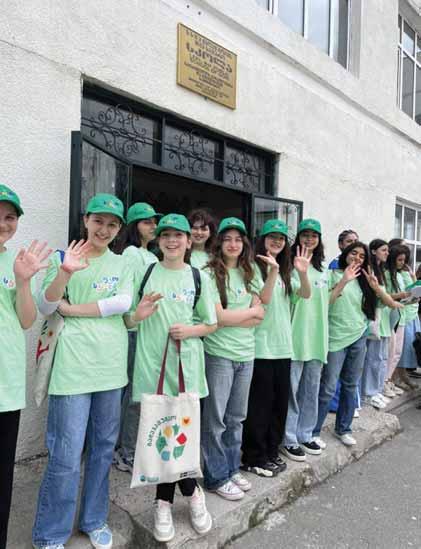
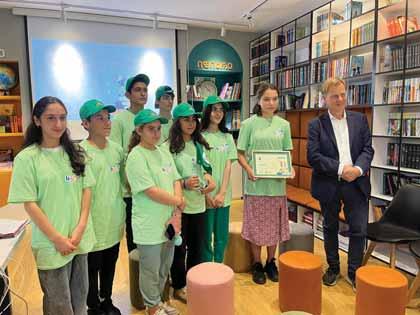
On June 28, the Embassy of the United Arab Emirates in Tbilisi, with the support of Red Crescent Society of the United Arab Emirates and in cooperation with the Administration of All Muslims of Georgia organized a charity project – Al-Adahi 2023, on the occasion of Eid Al-Adha (Feast of Sacrifice) during which several cows and sheep were slaughtered. Sacrificed meat was distributed to Muslim families in need. This initiative was implemented as a part of humanitarian activities based on the directives and vision of the UAE leadership.
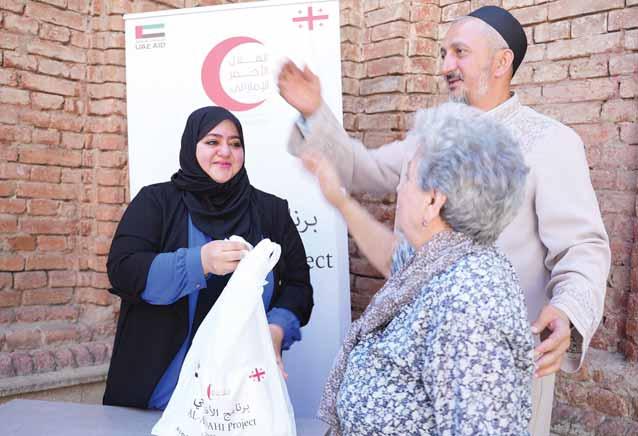
The event, held at Juma Mosque in Tbilisi, was attended by Muslim families, the Mufti of Eastern Georgia, Mr. Etibar Eminov and First Secretary of the Embassy
of the United Arab Emirates to Georgia, Ms. Munira Almarzooqi.
The UAE mission representative congratulated the families gathered at the mosque Eid El-Adha and thanked the Administration of All Muslims of Georgia for providing the Embassy with an opportunity to assist families in need on this important religious holiday and expressed readiness to continue and expand this kind of cooperation in the future.
For his part, Mr. Etibar wished the government and people of the United Arab Emirates a blessed and happy Eid AlAdha and thanked the First Secretary for the support provided by the Embassy.
Embassy of the United Arab Emirates to Georgia
tainable Development Goals and recognized around the world.
In 2020, the organization Keep Georgia Tidy (KGT) with the support of the Swedish government, officially became an associate member of the Foundation for Environmental Education (FEE) and the representative of the International Eco-Schools Program at the national level. An action strategy and a step-bystep plan were created, as a result of which implementation, about 500 public schools throughout Georgia were involved in the Eco-schools’ project. The program of Eco-schools consists of 3 main elements, is based on a 7-step methodology and contains 12 environmental topics. As a result of the successful implementation of the program, schools are given the opportunity to be awarded the Green Flag.
LEPL Gori public School N12
Pirveli Sviri Public School
Environmental Education Foundation are represented.
On June 20, the unveiling of Georgia’s latest Green Flag Award-winning schools took place. The schools received the award of the World Eco-Schools Program – the Green Flag, as symbolic proof that the schools have achieved significant results in terms of raising environmental education. The award ceremony was held on the territories of the schools, and representatives of the Swedish Embassy and local government attended together with the students of Eco-Committee along the whole school community, as did members of the organization implementing the Eco-Schools program, Keep Georgia Tidy (KGT) and its partner organization. The Eco-Schools program is an educational program promoting sustainable
development through the study of environmental topics in and outside of the classroom – through active action, observation, and research. The program raises students’ awareness of global environmental issues, helping them to become more eco-friendly and responsible citizens.
The Eco-Schools program unites the entire school community, facilitating cooperation between school staff, pupils, and their parents. Students develop teamwork and project management skills. Through the Eco-schools’ program, young people can change environmental policies around them.
Supported by UNESCO and the United Nations Environment Program (UNEP), the Eco-schools’ program is an incentive mechanism linked to the 2015-2030 Sus-
11 of the program’s pilot schools successfully completed the seven-step plan and applied for the Green Flag Award this year.
The Green Flag Award evaluation committee consisted of representatives of specialized ministries and their structural units, as well as representatives of the most active environmental non-governmental organizations and other interested parties. The commission thoroughly studied and evaluated the schools, as a result of which it was decided to award the Green Flag to all the nominated schools, because they are the very first implementers of the Eco-schools’ program in Georgia, and their efforts are very important for the future development and establishment of the program.
First Schools awarded with Green Flags:
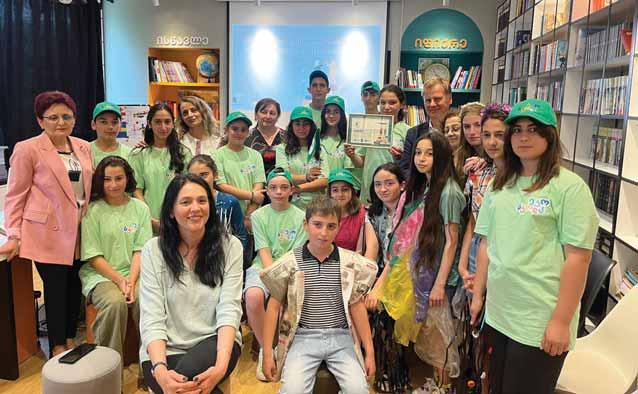
Krtsanisi Public School
Khurvaleti Public School
LEPL Kutaisi Public School N17
Rukhi Public School
DabaKeda Public School
Daba Naruji Public School
Telavi Public School N4
Shuapkho Public School
Benara Public School
This is the first, successful result and an opportunity for Georgia to appear on the world map of Eco-schools, where more than 80 member countries of the
The worldwide Eco-Schools program is implemented by the organization Keep Georgia Tidy (KGT) together with local and international partner organizations, with the financial support of the Swedish government, in cooperation with the Ministry of Education and Science of Georgia, the Ministry of Environment and Agriculture of Georgia, and the Center for Environmental Information and Education (CEIE).
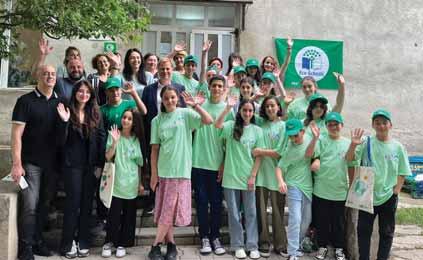
With the best panorama of Tbilisi, delicious dishes and a harmonious environment, the Belmond restaurant and lounge is ready to entertain you any season of the year and make every minute spent there unforgettable. Located in the central part of Tbilisi, on the twelfth floor of Onyx Hotel, Belmond offers a menu to suit all tastes, boasting international cuisine with Geor-
gian and European touches. Here, you’ll find everything from the panoramic views of the city to an exciting experience from the open kitchen of the celebrity chef.
The interior of the restaurant and lounge was very carefully selected by the designers to appeal to all- a classic style meets modern, combining a business and informal environment with a contemporary, sophisticated design and a truly distinct style. It is an ideal place to head for family or romantic dinners, business meetings, and corporate and entertainment events.
Belmond Lounge, is a space where an
exquisite blend of darkness and sparkling elements creates an enchanting atmosphere, with its cocktails, snacks, wine and coffee making it a great place to kick up your feet after a long day exploring all the beautiful sights of Tbilisi.
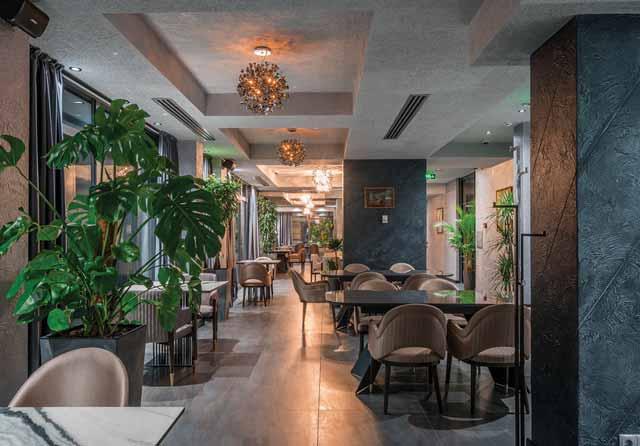


The Belmond team has also thought about people who are busy and looking for a comfortable space outside the office to work or hold meetings. The heart of every working guest will be made happy here- the time spent becoming so pleasant thanks to the location’s modern Georgian guest-hospitality. You’ll be sure to want to come back here again and again!
The Federal Air Transport Agency of Russia (Rosaviatsia) has given permission for 284 weekly flights between the cities of Russia and Georgia. The document is published on the website of the Russian Department, Ekho Kavkaza reports.
According to the agency, the Government of Georgia has not yet issued permission for the new flights.
The Russian agency issued most of the permits to the airline Red Wings, which wants to fly to the following destinations:
from Vladikavkaz to Batumi and Tbilisi (seven flights per week);
from Yekaterinburg to Batumi and Kutaisi (seven flights each);
from Zhukovsky to Batumi, Kutaisi and Tbilisi (seven flights each);
from Kazan to Batumi and Kutaisi (seven flights each);
from Krasnodar to Tbilisi (the document indicates an increase in frequency from 3 to seven flights), Batumi and Kutaisi (seven flights each);
from Makhachkala to Batumi, Kutaisi and Tbilisi (seven flights each);
from “Minvody” to Batumi and Tbilisi (seven flights each);
from Moscow to Batumi and Kutaisi (the document indicates an increase in frequency from 3 to seven flights);
from Nizhny Novgorod to Batumi,
Kutaisi and Tbilisi (seven flights each);
from Perm to Batumi, Kutaisi and Tbilisi (seven flights each);
from Rostov-on-Don to Batumi, Kutaisi and Tbilisi (seven flights each);
from Samara to Batumi and Kutaisi (seven-seven flights);
from Sochi to Tbilisi (frequency
increased from three to seven flights), Batumi and Kutaisi (seven flights each); from Tyumen to Kutaisi and Tbilisi (seven-seven flights); from Ufa to Kutaisi and Tbilisi ((sevenseven flights); from Chelyabinsk to Batumi, Kutaisi and Tbilisi (seven flights each);
In addition, the airlines Rossyia (SochiTbilisi, seven flights a week) and Yamal (Tyumen-Tbilisi and Tyumen-Batumi, one each) can fly to Georgia.
The airlines have not yet commented on the decision of the Russian agency.
Currently, direct flights between Georgia and Russia are operated by Azimuth
Airlines (from July 5 – two daily flights between Moscow and Tbilisi), Georgian Airways (from July – 10 weekly flights between Moscow and Tbilisi).
In the coming days, Red Wings will begin to operate Sochi-Tbilisi-Sochi and Moscow-Kutaisi-Moscow flights.

Afascinating new art exhibition has opened at Caucasus Culture Exchange on Aghmashenebeli Avenue, Tbilisi (see details below).
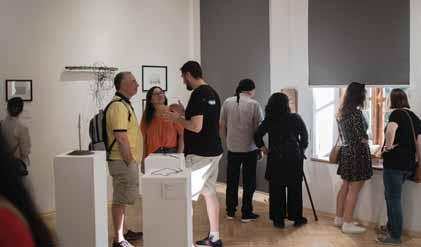
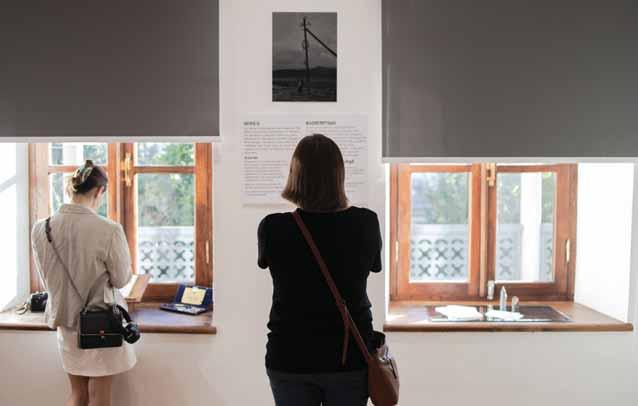

I met the artist for an interview recently. Giovannino Gabadze, 27, grew up in Tbilisi. The theme of her show is wires, primarily electrical wires on their poles or other devices. She doesn’t like only to take photos of her subjects, but also to sketch them, primarily in ink on paper, sometimes in sizes small enough to fit inside a 35mm film frame. Her camera is a Soviet-made Zenit film model from the 1960s, but she can resort to using her phone too, depending on what kind of feelings the wires give her.
WHY WIRES?
I have no idea! It’s just that sometimes
they explain what I’m feeling inside. I would see them and it would be like, “Oh, that’s what it is,” and I felt really connected to them. It’s something that helps me understand what is happening around me or inside me. I look at them and it happens super-fast. I can instantly connect what I see with my experiences or what I’m feeling, and I like this feeling the most. I don’t know what this is called, but I like puzzles in general, and for me this is like a puzzle piece that can describe how I am or what I feel.”
Heavy question! When I said for the first time “I am an artist,” it was just this year; but I’ve been doing art, such as sketching or singing, for as long as I can remember myself. I think the shooting of this new short video about me [also presented at the exhibition, link below], and the interviewer asking me how I see these wires and the world around me, really
helped me to understand who I am, and really gave me the confidence to say that I am an artist. I cried when I said it; Michelle [Gagnon], my show’s curator and the film’s director, was there. I felt really empowered after this. Being an artist was something that I had been avoiding saying out loud, as it’s such a responsibility. I knew that I was an artist in my heart, I’ve never had a conflict within myself about that, but to say it was a big thing for me. It was a random girl from Belarus that I first said it to when introducing myself, and it felt like a weight was being lifted from my shoulders, a beautiful feeling.”
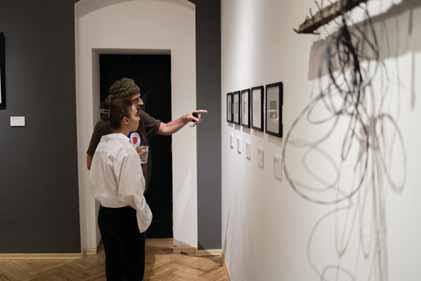
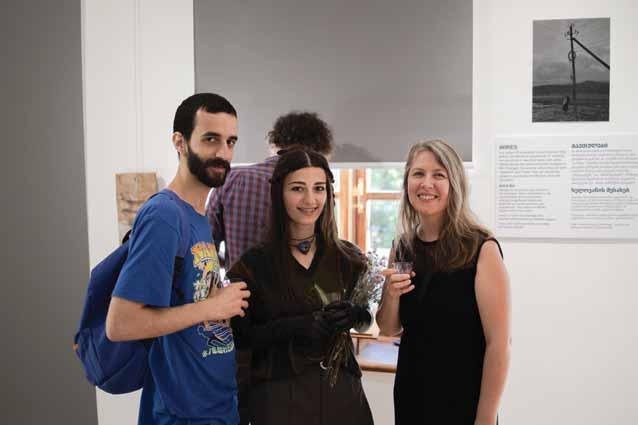
WHAT DO YOU WANT PEOPLE TO TAKE AWAY FROM THE SHOW?
I don’t know if I want them to do anything: just to come, observe, maybe try to take whatever resonates with them. I know what I DON’T want them to do: to guess what was happening inside of
me while I was making the sketches or taking the photos; I want them to consider what they themselves think while looking at these pieces. I don’t want them to think about the location of the pieces, or the timing, those details that for me don’t really matter sometimes. I want them to think about themselves, to see if it awakens any feelings inside of them.”
WELL, YOU’RE TAKING A RISK, BECAUSE YOU CAN’T CONTROL WHAT PEOPLE THINK. BUT THAT’S PART OF BEING AN ARTIST. I guess so. That’s true.
***
At the opening, show curator Michelle Gagnon reported that, “It was a really unique combination of people who came; we had everyone from young children to musicians, other artists and curators. One man told me how refreshing it was to come to an exhibition that was so ‘gentle’, because usually the art world demands that you ask really hard or deep questions, or offers controversial material. … People were asking Eli [Moyer, CCE director] and me about ways to collaborate in the future on projects or use the exhibition space themselves.”
Eli Moyer, CCE director, had this to add: “We at the Caucasus Culture Exchange could not have been prouder
on Saturday to host Giovannino’s excellent exhibition, ‘Wires.’ As a gallery that is part of a newly formed NGO, we focus on celebrating and preserving minority Caucasus cultures through the arts. The work now on display is both innovative and original, while connecting to important aspects of the past. Together with the deeply evocative short documentary by Michelle Gagnon, the whole exhibit really must be experienced firsthand. We hope many will take advantage of that opportunity during the month of July while the show is open.”
Curator: Michelle Gagnon
Photos by Mehrdad Ruien
“Wires” at Caucasus Culture Exchange
David Aghmashenebeli 109, second floor (https://goo.gl/maps/tYkhYoJddtR1h4j97) July 1-31, 2023 https://www.caucasuscultureexchange.org/ wires
Tony Hanmer has lived in Georgia since 1999, in Svaneti since 2007, and been a weekly writer and photographer for GT since early 2011. He runs the “Svaneti Renaissance” Facebook group, now with nearly 2000 members, at www.facebook.com/ groups/SvanetiRenaissance/ He and his wife also run their own guest house in Etseri: www.facebook.com/hanmer.house.svaneti
PUBLISHER & GM George Sharashidze
COMMERCIAL DEPARTMENT
Commercial Director: Iva Merabishvili
Marketing Manager: Natalia Chikvaidze
EDITORIAL DEPARTMENT:
Editor-In-Chief: Katie Ruth Davies
Journalists: Ana Dumbadze, Vazha Tavberidze, Tony Hanmer, Emil Avdaliani, Nugzar B. Ruhadze, Michael Godwin, Mariam Gorkhelashvili, Mariam Mtivlishvili, Erekle Poladishvili
Photographer: Aleksei Serov
Website Editor: Katie Ruth Davies
Layout: Misha Mchedlishvili
Webmaster: Sergey Gevenov
Circulation Managers: David Kerdikashvili, David Djandjgava
ADDRESS 1 Melikishvili Str.
Tbilisi, 0179, Georgia
Tel.: +995 32 229 59 19
E: info@georgiatoday.ge
F: GeorgiaToday
ADVERTISING & SUBSCRIPTION
+995 555 00 14 46
E-mail: marketing@georgiatoday.ge
Reproducing material, photos and advertisements without prior editorial permission is strictly forbidden. The author is responsible for all material. Rights of authors are preserved. The newspaper is registered in Mtatsminda district court.
Reg. # 06/4-309
